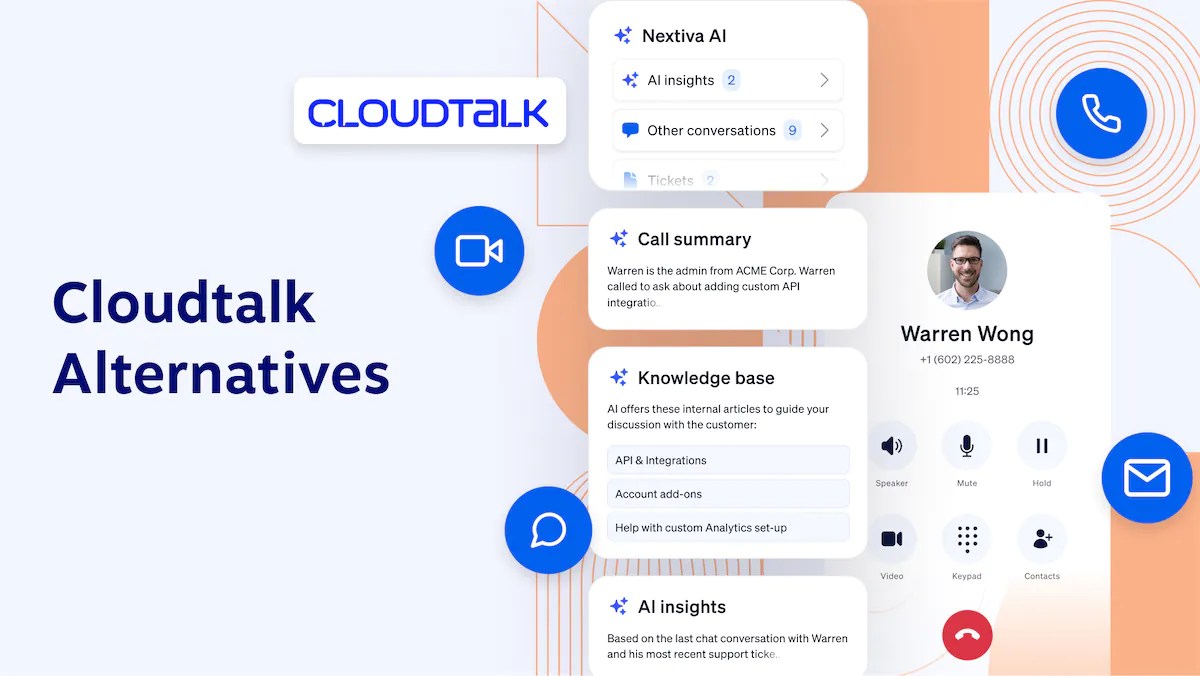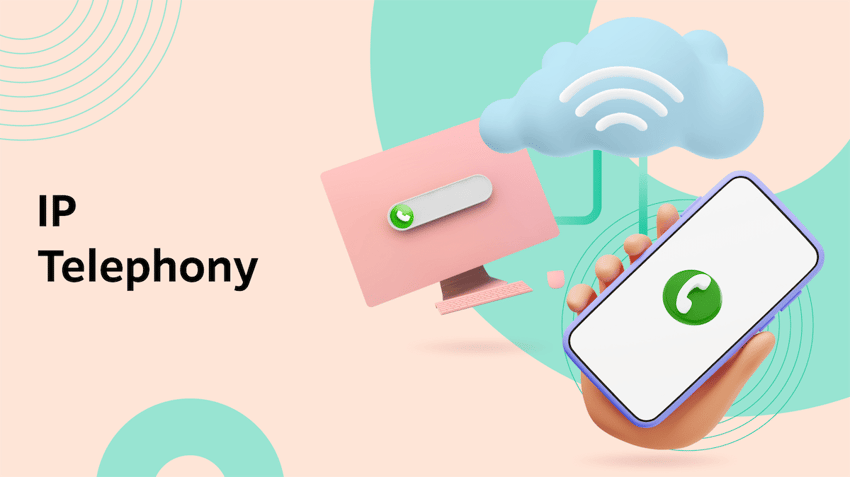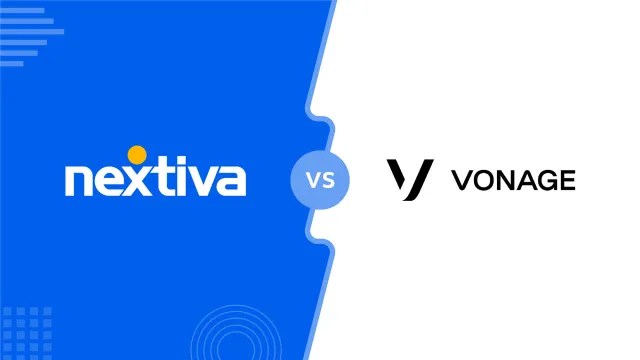CloudTalk is a strong choice for sales teams needing outbound power dialers. However, users often switch due to laggy call quality, slow support response times, and pricing add-ons.
If you’re looking for a cloud-based call center solution that offers better stability, clearer pricing, or deeper AI integration, this guide compares the top 10 alternatives to help you decide.
What Are Some of CloudTalk’s Strengths?
CloudTalk is a popular choice for sales and support teams thanks to its flexible core functionality. Key strengths include:
- Customization power: Users can design flexible routing rules and automated workflows to boost agent productivity.
- Essential features: The platform includes standard call center tools like IVR, call recording, and power dialing for outbound campaigns.
- Performance insights: Built-in analytics allow managers to monitor agent performance and identify coaching opportunities.
- CRM integrations: It connects easily with major CRMs like Salesforce, HubSpot, Pipedrive, and Freshdesk.
- Omnichannel support: Beyond voice, the platform supports SMS text messaging and mobile apps.
- Remote readiness: As a cloud call center solution, it lets agents work from anywhere with an internet connection.
Why Businesses Consider CloudTalk Alternatives?
Based on G2 and Capterra reviews, here are the top three reasons businesses leave CloudTalk:
- Support accessibility: Live phone support is gated behind higher-tier plans. If your phones go down, you might be stuck waiting for an email reply.
- Call quality issues: Users report occasional jitter and dropped calls, particularly on international routes.
- Hidden complexity: While the UI is clean, setting up complex IVR flows can be trickier than advertised.
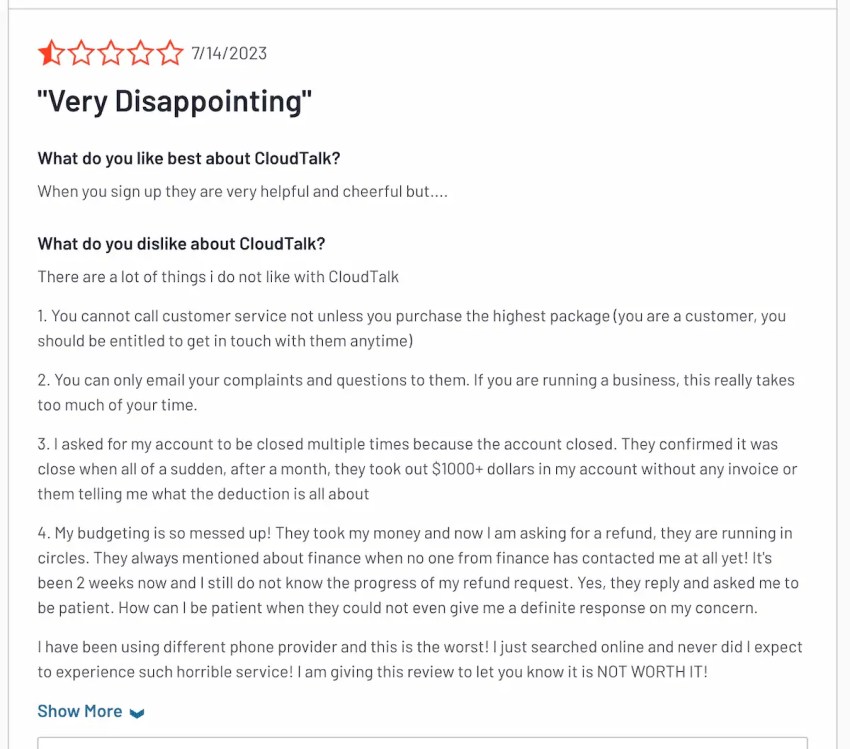
10 Best CloudTalk Alternatives
| Provider | Starting price | Best for | Key differentiator |
|---|---|---|---|
| Nextiva | $75/user/mo | Small and mid-sized businesses | 99.999% uptime + 24/7 support |
| Five9 | $159/seat/mo | Enterprise sales | Advanced outbound dialers |
| Talkdesk | $105/user/mo | Healthcare/retail | Deep industry-specific AI |
| Dialpad | $80/user/mo | AI early adopters | Real-time transcription |
| Aircall | $30/license/mo (Minimum 3 licenses) | CRM heavy teams | 100+ one-click integrations |
| Genesys | $75/user/mo | Global enterprises | Complete omnichannel journeys |
| RingCentral | $65/user/mo | Hybrid work | Unified video + phone app |
| 8×8 | Custom | International teams | Global unlimited calling plans |
| CallHippo | $19/user/mo | Startups | Fast setup for <5 users |
| JustCall | $29/user/mo | Outbound sales | Sales-centric features |
- Best overall alternative: Nextiva (Better reliability + 24/7 support)
- Best for enterprise: Five9 (Deep AI & WFM features)
- Best for budget: Dialpad (Strong AI transcription on entry plans)
1. Nextiva – Best Overall CloudTalk Alternative
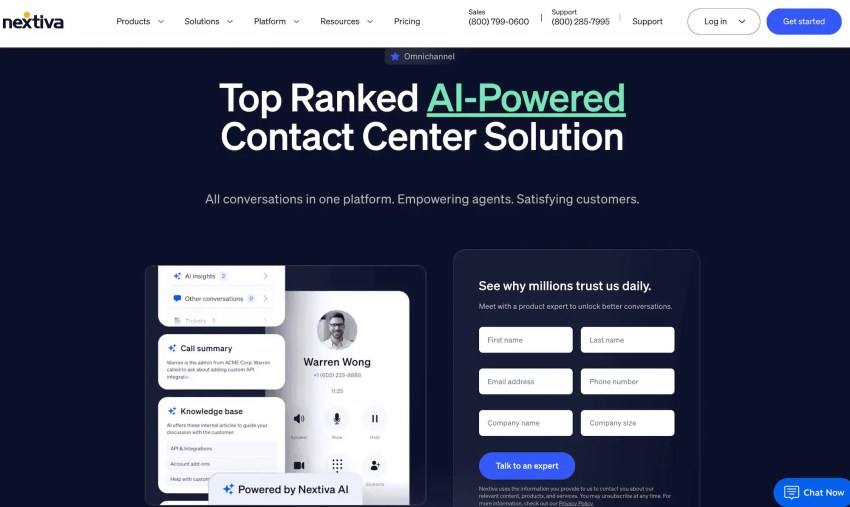
One of the best CloudTalk alternatives, Nextiva is a comprehensive unified communications (UCaaS) platform that goes beyond voice calls, offering features like video conferencing, team collaboration tools, and SMS/text messaging. It recently acquired Thrio, a leading contact center platform, to integrate AI-powered functionalities.
Key features:
- High-definition voice and video calling: Crystal-clear audio and seamless video conference calls foster impactful communication and collaboration across teams.
- Team collaboration tools: Nextiva integrates features like instant messaging and project management tools, streamlining internal communication and project workflows.
- SMS/text messaging: Engage with customers directly through text messages, offering a convenient and immediate communication channel.
- Intelligent call routing: Advanced call routing options include skills-based routing that directs inbound calls to agents with the most relevant expertise, which improves resolution times and customer satisfaction.
- Conversational AI: Uses AI in its Interactive Voice Response (IVR) system to understand customer inquiries and direct them appropriately.
- Workforce management: Helps with agent scheduling, performance tracking, and quality monitoring, ensuring optimal staffing levels and efficient agent performance.
- Analytics and reporting: Provides valuable data and reports on call center performance, helping businesses identify areas for improvement and optimize their operations.
Key strengths:
- Unmatched user experience: Nextiva is known for its intuitive and user-friendly interface, making it easy for teams to adapt and leverage its functionalities.
- Exceptional reliability: The platform prioritizes uptime, delivering high service availability (99.999%) and consistent high-quality call connections.
- Top-tier customer support: Nextiva receives consistent customer reviews for its readily available and helpful customer support team, ensuring you receive prompt assistance whenever needed.
Pricing:
- Essential: $75/user/month
- Professional: Contact sales
- Premium: Contact sales
Best for: Businesses of all sizes that need comprehensive unified communications with cloud-based call center functionality.
Considerations: While Nextiva caters well to businesses of all sizes, its pricing structure might be less competitive for users seeking a strictly basic call center solution.
2. Five9 – Best for Call Centers Prioritizing AI

Five9 is a prominent cloud-based software provider offering a comprehensive contact center solution. Their platform enables businesses to manage customer interactions across multiple channels, including voice, email, chat, social media, and SMS.
Key features:
- AI-powered call summaries: Automatically generate summaries of customer calls for faster review, improved agent training, and deeper customer insights.
- Workflow automation: Automate mundane tasks and streamline workflows to enhance agent efficiency and free up time for more complex customer interactions.
- Machine learning predictive dialing: Optimize outbound calling efforts by predicting when agents will most likely connect with live customers.
- Real-time analytics and quality assurance: Gain real-time insights into agent performance and call center operations.
Key strengths:
- Sophisticated feature set: Five9 offers a comprehensive suite of features that cater to advanced contact center needs, including AI functionalities and robust analytics.
- Omnichannel communication: Facilitates seamless customer interactions across various channels, ensuring consistent and positive experiences.
Pricing:
- Digital (Digital only): $119/seat/month
- Core (Voice only): $159/seat/month
- Plus (Advanced AI channels): Contact sales
- Pro (AI essentials + WEM): Contact sales
- Enterprise (Advanced AI + WEM): Contact sales
Best for: Five9 is well-suited for midsize to large call centers prioritizing AI/ML capabilities and third-party integrations.
Considerations: Some users report occasional downtime issues with Five9. Its feature richness might necessitate a steeper learning curve for some teams, and pricing may be a factor for budget-conscious businesses.
3. Talkdesk – Best for Empowering Live Agents with AI
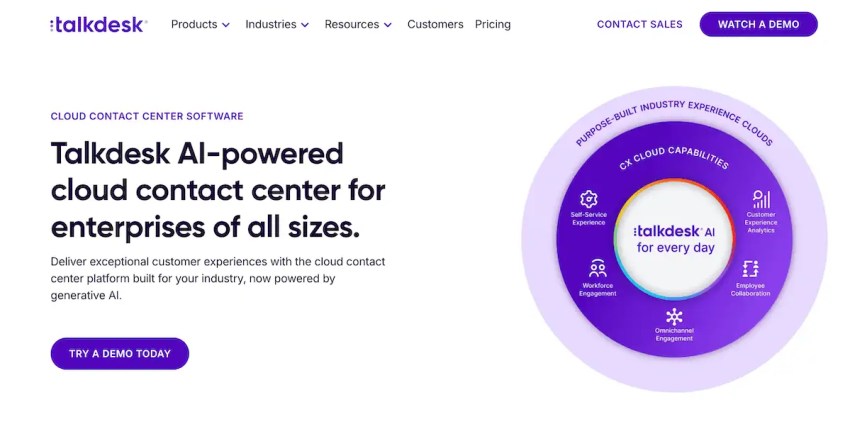
Talkdesk is a global contact center solution known for extensive AI functionality across various aspects of customer service, from self-service options to agent support and customer experience analysis.
Key features:
- Real-time agent support: Talkdesk equips agents with real-time coaching and guidance during calls, using AI to suggest appropriate next steps and optimize performance.
- In-depth data analytics: Gain comprehensive insights into agent performance, call center operations, and customer interactions with the software’s robust data analytics tools.
- Workflow automation: Self-service solutions powered by generative AI and no-code AI tools help automate workflows, boosting agent productivity.
Key strengths:
- Customizability: Businesses can tailor Talkdesk to their specific needs by customizing call flows, menus, and agent scripts.
- Integrations: Talkdesk integrates with many CRM and helpdesk applications.
- AI focus: The platform integrates AI throughout the customer service journey, from self-service options to agent support and analytics.
Pricing:
- CX Cloud Digital Essentials: $85/user/month
- CX Cloud Voice Essentials: $105/user/month
- CX Cloud Elite: $165/user/month
- Industry Experience Clouds: $225/user/month
Best for: While there are debates about the efficacy or use cases of contact center AI, Talkdesk is best for companies looking to leverage AI/automation to empower live agents.
Considerations: Talkdesk, with its AI functionalities, might have a steeper learning curve compared to simpler solutions. Pricing might also be a consideration for some businesses.
4. Dialpad – Best Virtual Phone System
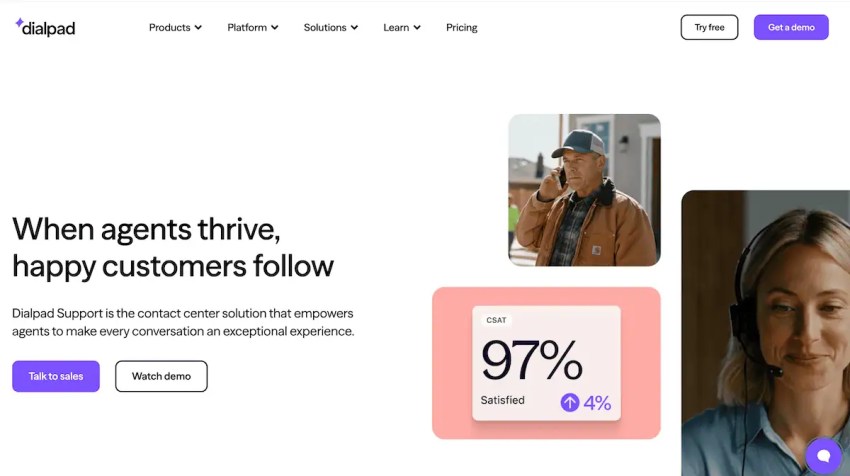
Dialpad is another AI-focused contact center solution offering omnichannel functionality. The platform offers live coaching and call sentiment analysis through AI features.
Key features:
- AI-powered call transcription and coaching: Dialpad uses AI to transcribe calls in real time, allowing for easier review, agent training, and performance evaluation. AI also offers real-time coaching suggestions to agents during calls.
- Live call coaching: Managers can monitor calls and provide live coaching to agents in real time.
- Omnichannel support: The platform goes beyond traditional phone calls, offering SMS/text messaging and web chat functionalities for customers to connect with your business.
Key strengths:
- AI-powered features: AI for tasks like smart call routing and bot-assisted chat improves efficiency and customer experiences.
- Scalability: The cloud-based platform adapts to growing businesses, supporting a wide range of user phone numbers.
- Contact center features: Offers advanced features like automatic call distribution and real-time analytics, ideal for businesses needing robust contact center capabilities.
Pricing:
- Essentials: $80/user/month
- Advanced: $115/user/month
- Premium: $150/user/month
Best for: Businesses wanting to lean into AI-based VoIP or virtual phone systems, particularly if Dialpad’s integrations are already in their tech stack.
Considerations: While Dialpad offers strong integrations and some advanced features, like scheduling meetings, require additional subscriptions to third-party calendar tools (e.g., Google Workspace or Microsoft 365). This can add to the overall cost depending on your specific needs.
5. Aircall – Best Simple VoIP Phone System
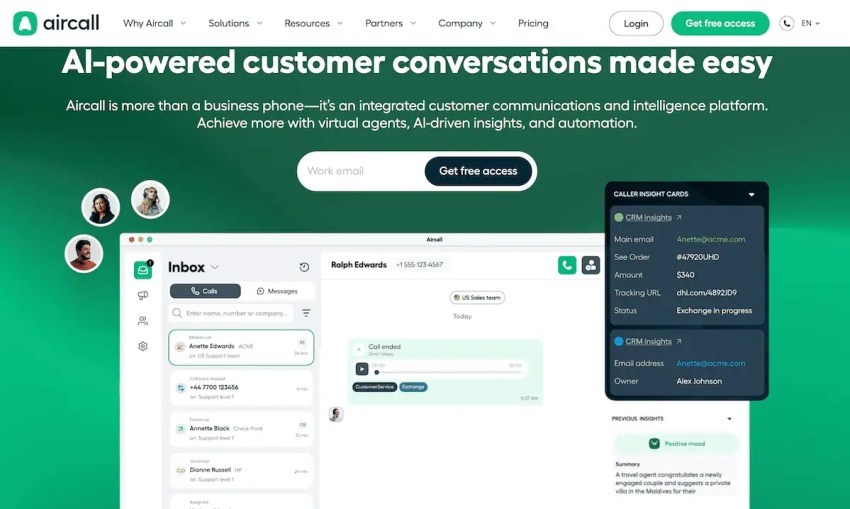
Aircall is another CloudTalk competitor worth considering, particularly if you’re looking for a relatively straightforward VoIP system. It was designed with sales and customer support teams in mind.
Key features:
- Straightforward user interface: Boasts a simple and intuitive interface, making it easy for teams to learn and adopt, especially for new cloud-based call centers.
- Reliable CRM integrations: Integrates seamlessly with popular CRM platforms.
- Scalability with add-ons: Offers a scalable solution, with the option to add on features like AI-powered functionalities and advanced analytics as your business needs evolve.
Key strengths:
- Cost-effectiveness: Compared to traditional phone systems, Aircall offers potentially lower costs, offering flexible pricing plans.
- Improved collaboration: Aircall facilitates seamless internal communication and collaboration, making it easier for geographically dispersed teams to work together.
- Focus on customer experience: Integrations with CRMs and features like call routing and analytics empower teams to deliver a better customer experience.
Pricing:
- Essentials: $30/license/month
- Professional: $50/license/month
- Custom: Contact sales
Best for: Small businesses needing a straightforward VoIP phone system with call monitoring/reporting.
Considerations: Aircall’s Essentials plan, with a minimum requirement of three users, might not be suitable for very small teams. Additionally, the Essentials plan offers limited customization options and excludes video conferencing features, which might be limiting for some businesses.
6. Genesys – Best for Enterprise Businesses
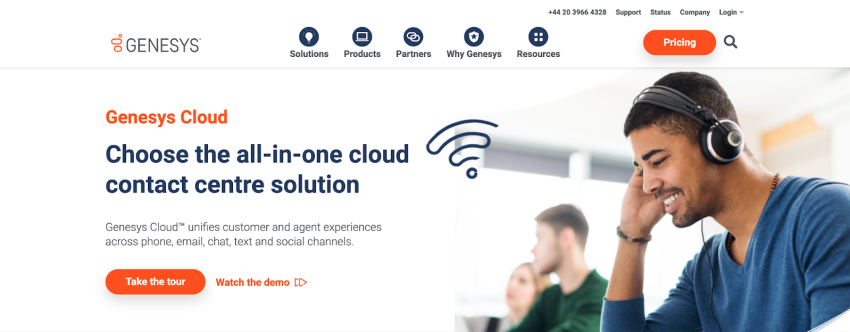
Genesys offers omnichannel CS solutions, cloud and AI technology, and flexibility to customers looking for a VoIP platform. Its contact center software offers cloud telephony for voice and digital services.
Key features:
- Predictive web engagement: AI anticipates customer needs on your website and proactively engages them with chatbots or targeted assistance, minimizing wait times and streamlining the customer journey.
- Conversational AI: AI-powered chatbots can handle basic inquiries and resolve simple customer issues.
- Agent assist and speech analytics: Empowers agents with real-time AI suggestions and insights gleaned from speech analytics to improve communication effectiveness.
- Omnichannel customer journey management: Facilitates seamless customer interactions across various channels, including phone calls, chat, email, social media, and web messaging.
Key strengths:
- AI-powered automation: Chatbots, self-service options, and intelligent routing boost efficiency and improve customer experiences.
- Data-driven insights: Comprehensive analytics empowers businesses to understand customer behavior, identify trends, and optimize their contact center operations.
- Scalability and customization: Genesys caters to businesses of all sizes, with the ability to scale to meet growing needs and extensive customization options to tailor the platform to specific requirements
Pricing:
- Genesys Cloud CX 1: $75/user/month
- Genesys Cloud CX 2: $115/user/month
- Genesys Cloud CX 3: $155/user/month
- Genesys Cloud CX 4: $240/user/month
Best for: Enterprise businesses looking for a unified, AI-driven cloud contact center solution with plenty of functionality and integration options.
Considerations: Some customer reviews mention occasional reliability and performance issues with Genesys, such as dropped calls or lag. Its extensive feature set might be overwhelming for businesses seeking a simpler solution, and pricing might be a factor depending on the specific features required.
7. RingCentral – Best for Omnichannel Contact Center Capabilities
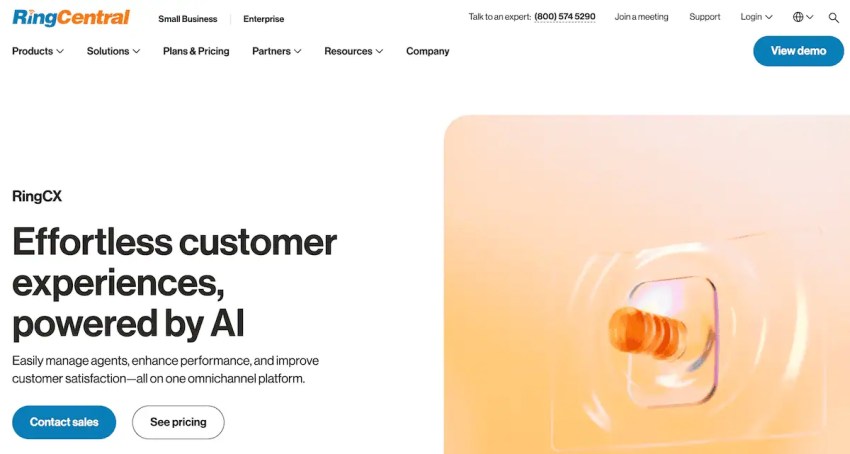
RingCentral’s RingCX platform (not to be confused with its RingEX VoIP phone system) leverages advanced AI, robust omnichannel capabilities, and seamless integration with unified communications to deliver a streamlined customer service experience.
Key features:
- All-in-one platform: Combines voice, video, SMS, social media, and team messaging in a single, easy-to-manage omnichannel interface.
- Advanced AI: RingCX (its contact center) is powered by AI technology, providing intelligent automation, real-time insights, and enhanced agent assistance.
- Real-time analytics: Comprehensive real-time analytics and customizable reports provide actionable insights into customer interactions, agent performance, and operational efficiency
Key strengths:
- Scalability for growth: Whether you’re a small team or a large enterprise, RingCentral scales with your business, offering customizable plans without complex technical hurdles.
- Remote work ready: With mobile and desktop apps, RingCentral supports hybrid and remote teams with reliable, high-quality communications.
- Great customer experience: AI-driven insights, omnichannel support, and seamless collaboration tools empower teams to deliver faster, more personalized service.
Pricing:
- Standard: $65/user/month
- Professional: $95/user/month
- Elite: $145/user/month
- Enterprise Contact Center: Contact sales
Best for: Mid-sized to large businesses seeking a unified, AI-powered omnichannel contact center with advanced analytics.
Considerations: The pricing is a little confusing to figure out. To use RingCX, a RingEX subscription is also required. This means the combined starting cost per agent is $85/month ($20 for RingEX Core + $65 for RingCX).
8. 8×8 – Best for Scalable Communications

8×8 is a CloudTalk alternative that’s particularly well-suited for enterprises and rapidly scaling teams that require a robust, secure, and highly configurable contact center platform. It offers a broad suite of cloud-based tools for voice, video, chat, and contact center operations.
Key features:
- Agent & supervisor workspaces: Intuitive, role-based dashboards provide agents and supervisors with real-time insights and performance metrics.
- Advanced analytics & reporting: Analytics, customizable dashboards, and customer journey analytics help organizations monitor performance and optimize workflows.
- Workforce Engagement Management (WEM): Includes quality management, coaching, workforce management, and post-call surveys to support agent development.
Key strengths:
- Scalability: Easily adapts to seasonal changes and business growth, making it suitable for both mid-sized and large organizations.
- Strong analytics & reporting: Detailed call analytics, sentiment analysis, centralized reporting system, and AI-driven insights help businesses optimize communication and service.
- CRM & app integrations: Integrates with leading CRM systems like Salesforce, Microsoft Teams, Slack, and more, plus APIs that allow for integration with other platforms and services for more flexibility.
Pricing: For current and custom pricing, contact sales.
Best for: Mid-sized to large businesses with global operations or compliance needs, looking for an all-in-one voice and contact center solution.
Considerations: 8×8 does not list its prices on its website, so this lack of transparency makes it difficult to compare when shopping around for a good contact center solution. You may also be surprised by hidden or extra fees for E911, regulatory fees, international calls, hardware, and some features.
9. CallHippo – Best for Budget-Conscious Teams
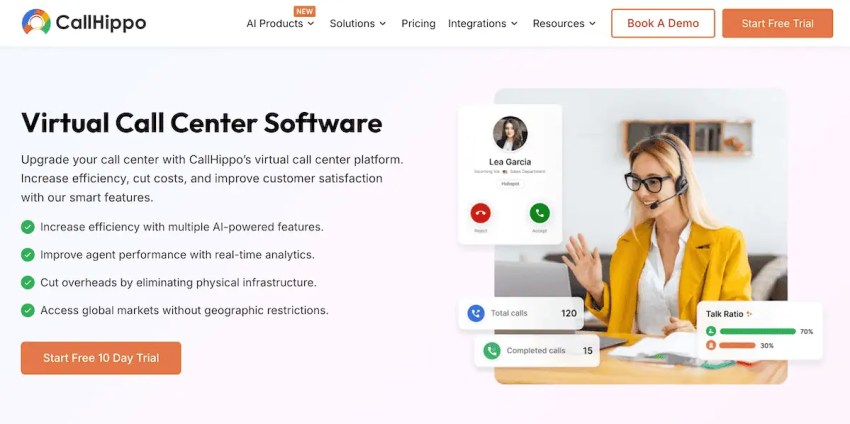
CallHippo is a flexible VoIP solution designed with growing businesses in mind. Known for its quick setup, wide selection of international numbers, and ease of use, it’s especially appealing to startups and SMBs building global customer support or sales teams on a budget.
Key features:
- Smart call routing: Route calls based on time zones, user availability, or priority using advanced call management tools.
- Smart dialer & call forwarding: Built-in power dialer connects with leads by automatically redirecting calls to available agents or devices so that no call goes unanswered.
- Global connect: Instantly acquire virtual numbers in 100+ countries, mask caller IDs to appear local, and manage calls across time zones.
Key strengths:
- Cost-effective: Offers one of the lowest entry points in the market, with flexible plans and no hardware investment required.
- Fast onboarding: Teams can be up and running in minutes, with a user-friendly dashboard that requires minimal technical expertise.
- Scalable & remote-ready: Cloud-based architecture supports teams of any size, with no geographic restrictions and minimal IT overhead.
Pricing:
CallHippo has two general plans, each with several pricing tiers.
Essential (AI-enhanced customer support solutions):
- Starter: $19/user/month
- Professional: $29user/month
- Ultimate: $45/user/month
- Enterprise: Contact sales
Pro Suite (AI-optimized for bulk calling in sales, support, and call center teams):
- Bronze: $35/user/month
- Silver: $39/user/month
- Platinum: $49/user/month
- Enterprise: Contact sales
Best for: Startups and small teams looking for a fast, cost-effective VoIP solution with international coverage.
Considerations: While CallHippo is highly cost-effective and feature-rich for its price, some advanced tools (like AI transcription or advanced analytics) are only available on higher-tier plans or as add-ons. Larger businesses may outgrow the platform’s limitations as their needs evolve.
10. JustCall – Best for SMBs & Sales Teams
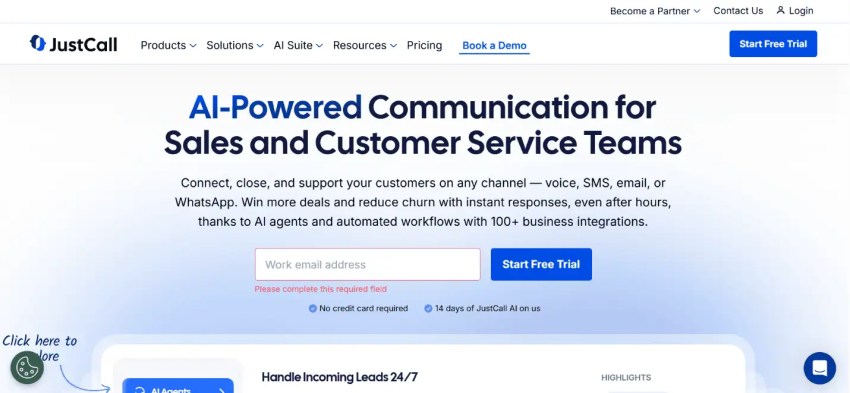
JustCall is a versatile cloud-based phone system tailored for sales and customer support teams looking to streamline communications and automate daily workflows. Its built-in productivity tools are great for teams focused on outbound calling, inbound support, and detailed call tracking.
Key features:
- CRM & helpdesk integrations: Connects seamlessly with over 100 tools, including HubSpot, Salesforce, Zoho, Pipedrive, Intercom, and more.
- Call automation tools: Power dialer, call scheduling, voicemail drop, and call disposition tracking help teams increase efficiency.
- Conversation intelligence: AI-based features like call scoring, transcription, and sentiment analysis are available on higher-tier plans.
Key strengths:
- Sales-focused productivity: Automation features and dialing tools make JustCall a great fit for outbound sales teams.
- Quick deployment: Setup is straightforward, with browser-based apps and mobile support for remote or hybrid teams.
- Data-driven coaching: Call analytics and real-time coaching tools enable team leads to monitor and improve performance.
Pricing:
- Team: $29/user/month
- Pro: $49/user/month
- Pro Plus: $89/user/month
- Business: Contact sales
Best for: Sales and support teams that need robust CRM integration, productivity tools, and multichannel communication.
Considerations: While JustCall is rich in outbound sales features, businesses seeking unified communications (including video conferencing or internal messaging) may find it limited.
How To Choose the Right CloudTalk Alternative
Here are some key takeaways for choosing the best alternative to CloudTalk or any other contact center solution:
- Audit your motivation: Before booking demos, define why you’re switching. If support is too slow, prioritize providers with 24/7 phone access. If quality is poor, look for a carrier-grade network. If costs are high, seek flat-rate unlimited calling plans.
- Verify the uptime guarantee: In VoIP, reliability is currency. Look for the gold standard of 99.999% uptime, which amounts to only about 5 minutes of downtime per year. Always check a provider’s public status page history before signing a contract.
- Test integration depth: Not all CRM connections are equal. Shallow integrations just log calls, while deep integrations pop customer profiles before you answer and auto-log recordings. Ask to see the screen pop feature live during your trial to ensure it is fast enough for your team.
- Check for hidden usage fees: Be wary of fair usage policies on unlimited plans, which cap outbound dialing. Watch out for extra per-minute charges for AI transcription or voicemail drops, and ask for a total cost estimate that includes all projected usage.
Key takeaway
- For superior reliability: Choose Nextiva if uptime and 24/7 support are your top priorities.
- For AI-powered insights: Select Dialpad if you need real-time transcripts and coaching on entry-level plans.
- For simple sales dialing: Stick with CloudTalk or try Aircall if your main focus is straightforward outbound calling for sales teams.
CloudTalk vs. Nextiva: Which Should You Choose?
| Feature | CloudTalk | Nextiva |
|---|---|---|
| Support | Email-first; phone gated by tier | 24/7 phone support (all plans) |
| Reliability | Good (dependent on the internet) | Excellent (99.999% carrier-grade) |
| Platform | Call center focused | Unified (UCaaS + CCaaS) |
| Integrations | Strong (Salesforce/HubSpot) | Extensive (Microsoft/Salesforce/Google) |
| Pricing | Add-on heavy | Tiered |
Features and customer journey
CloudTalk focuses primarily on outbound dialing, call routing, and CRM integrations, making it effective for sales workflows that rely heavily on voice calls.
Nextiva provides a unified system that combines voice, video, SMS, team collaboration, and contact center functionality. Nextiva users can manage their entire communication stack in one place, allowing teams to switch seamlessly between chat, voice, and video without losing context of their conversations.
Analytics and business intelligence
CloudTalk offers standard reporting that tracks agent performance and call volumes, which is useful for monitoring daily activity.
Nextiva delivers deeper business intelligence, including sentiment analysis, churn forecasting, and real-time dashboards. Nextiva empowers leadership teams to identify at-risk customers and make data-driven retention decisions rather than just tracking call duration.
Reliability and support
CloudTalk relies on an email-first support model, with live phone assistance restricted to higher-tier plans.
Nextiva includes 24/7 U.S.-based support, onboarding, and training with every plan, regardless of size. Nextiva operates on a geo-redundant network with 99.999% uptime, ensuring operations continue smoothly even during local outages.
Integrations and ecosystem
CloudTalk integrates with major CRM platforms, such as Salesforce and HubSpot, with a specific focus on sales tools.
Nextiva supports over 30 turnkey integrations, including Microsoft Teams, Slack, and Zendesk, along with flexible APIs. Nextiva’s broader ecosystem supports complex tech stacks across sales, marketing, and operations without the need for custom development.
Pricing and scalability
CloudTalk uses an add-on model where advanced features often increase monthly costs as teams expand.
Nextiva uses predictable pricing that bundles unified communications with contact center capabilities. Nextiva allows teams to forecast costs and scale features without encountering unexpected fees.
Which one fits?
Choose Nextiva if: You need a reliable, all-in-one U.S.-based platform that combines phone, video, and contact center tools with guaranteed uptime.
Choose CloudTalk if: You are a sales-focused team specifically needing local presence in niche European markets.
Ready to upgrade? Book a Nextiva Demo today to see the difference stability makes.
A Full-Featured AI Contact Center Solution
Save time and money, reduce agent and supervisor stress, and flexibly adapt to your businesses needs.

















 VoIP
VoIP 
